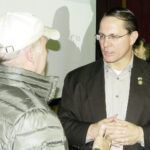
By Michael Howell
“Federal control of public lands is destroying forests and water sheds, shutting off access, constricting economic opportunity, breaking the state and local budgets, and threatening our way of life.” That’s the message that Utah Representative Ken Ivory brought to a roomful of people at the Eagles Lodge in Hamilton last Wednesday, December 11. He came to the valley at the request of County Commissioner Suzy Foss who has asked the other commissioners to consider joining the American Lands Council, a lobbying organization directed by Ivory, that aims to transfer federally owned lands to state control and possibly to state and private ownership. He calls it the “only solution big enough.”
Ivory also claims that this solution was the original intention of the Enabling Acts that created the states. He says that every one of the states was “promised” that the federal land within its borders would be relinquished to the states “in a timely fashion.” He claims that the federal government only intended to hold title, or to hold the land in trust, temporarily and then it would “extinguish title” to the land, enabling the states to tax it in order to fund education, grow their economies and utilize their resources.
Ivory argues that it was only in 1976 that Congress explicitly gave up the intention of transferring land to the states declaring in a new policy, the Federal Land Policy Management Act, that its intention was to retain federal lands in federal ownership. He argues that this act of Congress violated the original state compacts and infringed upon the states’ sovereignty, impairing their ability to raise funds. To address this issue, he claims, Congress then enacted the Payment In Lieu of Taxes program. Once timber receipts dropped on the national forests due to changing management policies, Congress then enacted the Secure Rural Schools Act to funnel more money to the states for education.
As a result, states across the West that are still dominated by federally owned land became dependent upon a money stream that is now being scaled back because “the federal government is broke.” Montana, he points out, gets 42% of its budget from the federal government through such avenues as PILT and SRS payments.
Ivory argues that there is no way to make up this gap through raising taxes. “We have to look at public lands,” he said. He argues that the states are better managers of public land because the issues are clearer and the elected officials are “neighbors” and can be held accountable for their actions. Once freed from federal control the public lands can then be mined, logged, and possibly even sold to produce the income necessary to deal with a state’s obligations which consist of caring for “sick people, poor people, education, roads and public safety.”
Ivory states that the only thing stopping the Western states from compelling the federal government to turn over its land to them is the lack of “knowledge and courage.” Nebraska, for instance, is now only 1% federal land while Nevada is more than 80%.
“The same promises were made, the language is the same, so why the difference?” he asks.
He said several states were asking that question, including Montana, and had passed legislation to study the issue of transferring federal lands. In Utah the effort, supported by Ivory’s American Lands Council, has passed legislation calling for the transfer of all the federal land in Utah to the state by December 31, 2014.
In the question and answer period after his talk someone noted that attorney generals for Utah and Wyoming had each issued opinions that the law requiring the transfer was unconstitutional and would be struck down by the Supreme Court.
Ivory said, “Get five lawyers in a room and you’ll get ten different opinions.”
Stewart Brandborg, founding member of Friends of the Bitterroot and Bitterrooters for Planning, said that he had worked in federal agencies in Idaho and Montana and worked for 30 years in Washington D.C. for conservation organizations.
“In my long experience there I learned one thing,” said Brandborg, “that the people of this country value the public estate being managed by BLM, USFS, U.S. Fish and Wildlife, and the national park system. They hold it dear to their hearts and claim ownership. Your proposal to turn those over to the states for disposal and sale to the private sector won’t go over with the general public. They want these lands held in trust for the American people. In the final analysis you must go to Congress to turn these lands back for disposal but the American people won’t stand for that. They value these lands as part of their ownership in the public estate. So I appreciate your fine presentation, but you are not serving the public interest of those of us who appreciate this grand place we live in.”
Brandborg’s comments were followed by sustained foot stomping, hollering and applause by much of the audience.
Ivory said that the debate would go forward and become more urgent as the federal money runs out.